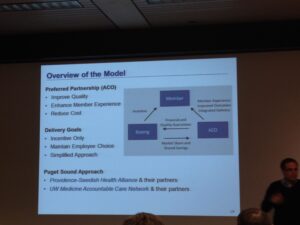The Health Innovator’s Collaborative sponsored by the University of Washington and the WBBA is entering its second year and continuing to gain momentum bringing together providers, payers, and health innovators from education, public sector, and industry to discuss hot topics in health. This week marked the second talk in the new season, delivered by Greg Marchand, Director of Benefits and Policy Strategy at The Boeing Company.
The Health Innovator’s Collaborative sponsored by the University of Washington and the WBBA is entering its second year and continuing to gain momentum bringing together providers, payers, and health innovators from education, public sector, and industry to discuss hot topics in health. This week marked the second talk in the new season, delivered by Greg Marchand, Director of Benefits and Policy Strategy at The Boeing Company.

Boeing made headlines for their “ACO” approach where they contract directly with healthcare providers and negotiate for service and Marchand came to the Health Innovator’s Collaborative to describe how they did it and why this is the model for the future.
Washington Hospitals, Boeing Strike ACO Deal
Boeing Signs Shared Savings Deal With Washington Hospitals
Finding the Defects
Marchand’s focus is on continually improving defects in the system and that includes the patient/provider relationship: making sure patients do what they are supposed to do. It also includes using the appropriate forms of communication and care for the situation. Here he gave two examples: using a house call service from Seattle-based Carena for non-emergency issues, especially with children, and being able to email or text your doctor with simple questions, like how to deal with side effects from prescribed medication. Both of these examples provided a higher level of service to the end-user and also lower costs to the entire system. A Carena house-call is 1/3 of the cost of an emergency room visit and email and texting is more efficient and less expensive than a phone call and most certainly than an office visit.
Understanding Cost Drivers
From all the data analysis, Boeing understands very well where its largest cost drivers are coming from and ways to improve, and from Marchand’s talk it was clear that they were very much in the driver seat in pushing their healthcare partners to innovate. Areas of focus include improving the usability of patient communication tools, managing population health, providing easily actionable data for the clinical team, and using the most appropriate and cost effective methods for care. Marchand gave the example of how incentives need to be better aligned to spend money on physical therapy rather than back surgery: again a situation where the patient experience is dramatically improved and costs are lowered, however incentives must be aligned because today, hospitals make more money on surgery than preventative care. Boeing and the ACO vision of the future changes that of course.
The Q&A portion of the event was quite lively and extended far beyond the allotted time. One notable question was about why other employers are not taking the same approach as The Boeing Company. Marchand wishes they would but acknowledged it’s a lot of effort and certainly the data-driven approach is in Boeing’s DNA. As well, only the largest companies have the resources for this type of undertaking.
If you’re in Seattle and interested in the massive changes coming in health and looking for a community of like-minded people plus lively debate, then we recommend you check out the series. Talks are the first Tuesday of every month. We’ll see you there!